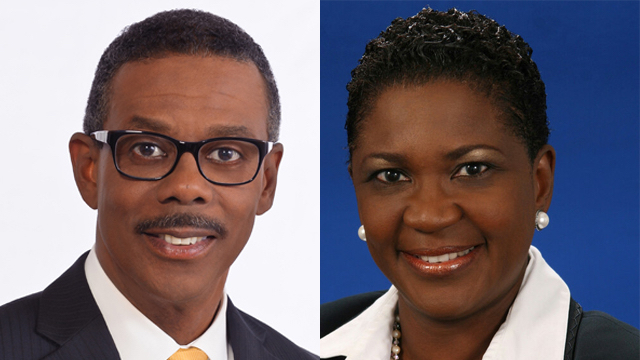
By Shermain Bique-Charles
Political party leaders need to make identifying female election candidates a priority.
That’s the word from Joanne Massiah, leader of the Democratic National Alliance (DNA). Her comments come days after the country’s main opposition, the United Progressive Party (UPP), revealed that women will not form a major part of its raft of candidates.
Leader Harold Lovell said this week that women were not “rushing forward” to join the political arena, and only about three females are expected to run on the UPP’s ticket at the next poll.
On Monday, the UPP released the names of its first four candidates – and they are all men.
“I am very keen to make sure we have at least three women on board. Ideally, I would have liked to have at least 25 percent of the slate as women,” Lovell admitted.
However, he said many of the women the party had approached turned down the offer.
“They are sometimes not quite ready … there are those who I think would make excellent candidates but when I approach them, they feel like politics is not for them. I am concerned about that,” Lovell said.
He continued, “If there’s a woman and a man who are equally competitive, I would go with the woman. If a man is clearly much better positioned to win a constituency, then I don’t believe in tokenism; I don’t believe you should just put a woman for the sake of putting a woman,” he explained.
The UPP leader said another hindrance is that people are not willing to leave their jobs in the public sector to compete in an election that may not go in their favour.
But Massiah is convinced that party leaders are not making finding women willing to run a priority.
She said political parties must have a firm commitment to recruiting female candidates.
“I do not believe that there is this commitment to invest in women. Unless you have a leader who is committed to gender equity and parity, then you are going to have these lame excuses,” she said.
“Women are not like fruits on trees waiting to be picked.”
The DNA leader told Observer that for women to survive in politics, they must remain focused.
“You have to understand the challenges of the constituency that you represent. Women do face hardships in politics and this is why they need a greater degree of support,” she said.
There is a common misconception, according to Massiah, that men have the inherent right to govern. “I disagree with that totally,” she said.
As of October 2019, the global participation rate of women in national-level parliaments stood at 24.5 percent.
The English-speaking Caribbean fares slightly better with women making up around 30 percent of elected positions, and occupying just over one in five of Cabinet posts.
The region has seen a number of female leaders. Dominica was the first to have a female prime minister when Dame Mary Eugenia Charles came into power in 1980. Current female leaders in the Caribbean include Paula Mae-Weekes, president of Trinidad and Tobago, Mia Mottley, Prime Minister of Barbados, and Turks and Caicos’ Premier Sharlene Cartwright-Robinson.
